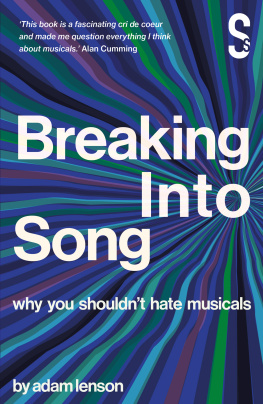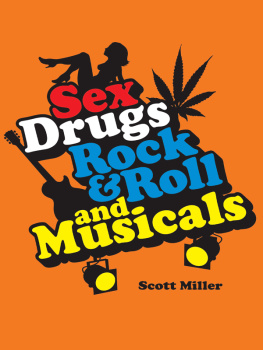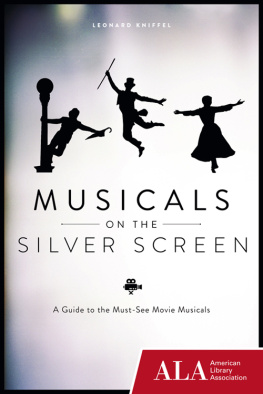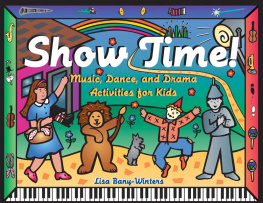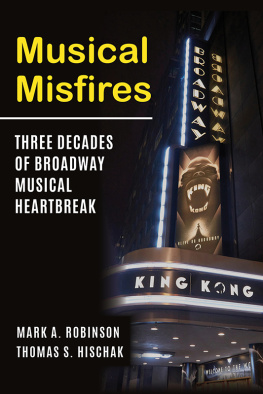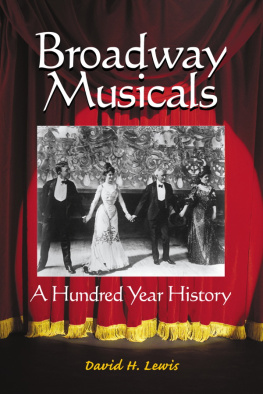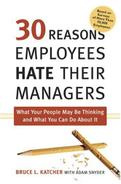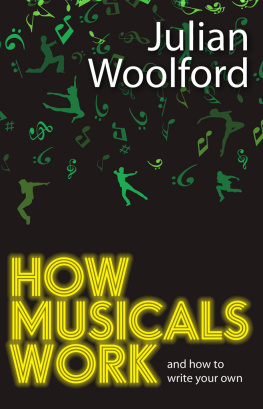


First published in 2021 by Salamander Street Ltd.
()
Breaking into Song Adam Lenson, 2021
All rights reserved.
You may not copy, store, distribute, transmit, reproduce or otherwise make available this publication (or any part of it) in any form, or binding or by any means (print, electronic, digital, optical, mechanical, photocopying, recording or otherwise), without the prior written permission of the publisher. Any person who does any unauthorized act in relation to this publication may be liable to criminal prosecution and civil claims for damages.
ISBN: 9781914228025
10 9 8 7 6 5 4 3 2 1
CONTENTS
BREAKING INTO SONG
M usical theatre is a medium full of possibilities. As the intersection between music, song and storytelling theres literally an infinite amount of different possible musicals. Musicals of different styles and tones and genres. Musicals that use song and scene in vastly distinct ways. Musicals that intersect with varied parts of the theatre ecology.
But musical theatre has come to be publicly defined by an extremely narrow range of examples. The form seems to be entirely defined by a small set of those musicals. Now I would firstly say that I love a great number of those musicals. However, I am forever amazed by how much power a small selection of shows have over the perception, possibility and range of this form. I dont need to name them. You know the ones I mean.
I will say again that I love and admire many of these shows. But they are but a narrow fraction of the possibilities of the form. Music and stories are infinite and so are musicals. I also feel that a small group of musicals being collated together, both here and in public consciousness sort of flattens out any of the radical choices that these shows made.
The extreme prominence of a small selection of shows that largely function in a certain way leads to musical theatre being a medium that people think they can understand with very few data points. My sense has always been that people decide what musical theatre is faster and in a more lasting way because the public perception of the medium is linked to this very small range of works. Moreover, even as new data points come into the zeitgeist, I find a startling number of people still refer to the same canonical data points and think of any new shows as anomalies.
For some reason, people seem to think they can understand the form of musical theatre from this incredibly small number of shows. How many films would you say need to be watched before you make a judgement on the possibilities of the medium? How many books would you say need to be read before you can make a judgement on the possibilities of the medium? Im not trying to sound elitist. I truly believe in the democratisation of form. I just wonder why musicals get judged more quickly and more lastingly.
Time and again I notice that people have made up their mind about musical theatre from having seen or heard only a few shows. Of course, the form has intrinsic traits that some people might find plainly unlikeable. But again, I am amazed by how often people refer to the few shows they hated before deciding the medium wasnt for them. They rarely take time to seek out shows that function differently. I am also regularly amazed by how many people who hate musicals, love music. The sort of people with hard drives of music and specialised headphones and speakers seem to be the ones who hate musicals the most. But musical theatre is just music and stories. So why do we imagine so narrow a range of possibilities when we hear the term?
I think that the issue with the widespread presumptions being made about musical theatre is that they lead to systemic issues that reaffirm and solidify those presumptions. If only people who like those musicals programme musicals, then we just get more shows that resemble those musicals. If people who might see other possibilities for musical theatre dont produce musicals, then we dont get new shows or different shows and we dont build new audiences. Moreover, if we only prize and celebrate commercially successful hit musicals then the ecosystem that leads to the building of other types of musical will slowly crumble and vanish. Leaving only one path to creating musicals and only one resultant type of musical. So when the haters say I hate all musicals, they will become increasingly correct as the form becomes shallower and more restricted. A series of clones that look, function, and act alike.
Musicals dont have to look like that, or sound like that, or be about that. Think about it for a second. Its quite a freeing thought. There might well be things you dislike about the way lots of musicals are produced, or acted, or sung. But they dont have to be produced, or acted, or sung like that. There might be fundamental things you dislike about too much story being communicated via music. And if so, I admit that musicals might not ever be for you. But I often wonder how many audiences and musicals are being lost because of a series of misunderstandings about what musicals are, or have been, or could be.
And I will say here, that I love musicals. There is something about the stacked verticality of musicals, the layering and interweaving of musicals, the informational overwhelm of musicals that sets me on fire. But I also acknowledge that something about the way musicals have come to be defined and represented and thought about has led to a great deal of restriction on the shows that are seen, and produced, and made.
I will also say here that I often worry that those who love musicals are just as dangerous to the future of the form as those who hate them: because both those who love and hate musicals share the same idea of what musicals are. The same restricted, narrow data set of musicals is what leads a certain group to decry their hatred and another group to pledge their devotion. But what I am asking for perhaps might threaten both of these groups. I am asking for the expansion of what musicals are. The expansion of the musicals we see. The expansion of the musicals we make and produce and support. In asking for this I am also asking for everyone on both sides of the love/hate divide to open their minds.
What I hope most is that people might catch themselves when they make rigid, inflexible statements about a form that is so rich with possibility. The 21st century seems to have awakened a desire for more stacked experiences: people listen to music while they run, they scroll Twitter while they watch TV, they listen to podcasts while they do the cooking. Our brains crave stimulation and more than ever we are looking for experiences that combine and blend other experiences. Gigs, festivals, art installations, television, books, food, games are all blending into one another via the distributed effects of the internet. As I watch this happen, I ask why are musicals stubbornly connected to such few data points? Why is public perception so glued to a type of singing, a type of acting, a type of storytelling that is just one drop in the ocean that is created by music and theatre?
I dont just want people to re-evaluate their presumptions though. I want more musicals. A wider range of musicals. I want them seen in a wider range of venues and locations and by a wider range of audiences. But, I believe that changing the landscape of musical theatre will start with changing the presumptions that so many hold about the form. It is our core values and our core beliefs that dictate the art we make and the art we consume. I have noticed that musical theatre seems to be allowed less space than I believe it deserves and I have begun to realise that this is driven by deeply rooted core values and beliefs about the form which have become ossified and immovable. This book is my attempt to move them.
Next page
